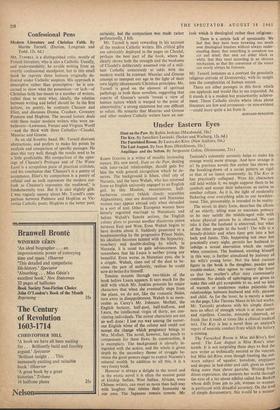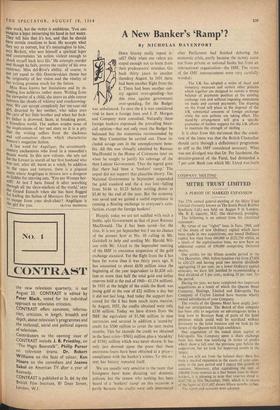Under Eastern Eyes
Dust on the Paw. By Robin Jenkins. (Macdonald, 18s.) The Key. By Junichiro Tanizaki. (Seeker and Warburg, 12s. 6d.) The Furnished Room. By Laura del-Rivo. (New Authors, 16s.) The Last August. By Jean Ross. (Hutchinson, 16s.) Angelique and the Sultan. By Sergeanne Golon. (Heinemann, 21s.)
ROBIN JLNKINS is a writer of steadily increasing stature. His new novel, Dust on the Paw, dealing with inter-racial relationships, should gain for him the wide general recognition which he de- serves. The background is Isban, chief city of Nurania, and the hero Wahab, who has returned from an English university engaged to an English girl. In this Moslem, mountainous, half- barbarous country (which closely resembles Afghanistan), men are dominant and Nuranian women may appear abroad only when shrouded in a sort of tent. Other European women have bitterly regretted marriage to Nuranians and before Wahab's fiancée arrives, the English colony plots to prevent another disastrous union between East and West. Even Wahab begins to have doubts about it. Suddenly promoted to a headmastership by the progressive Prince Naim, his idealism becomes tainted with the hypocrisy, treachery and double-dealing by which, in Nurania, it is usual to gain advancement. He remembers that his Laura is neither young nor beautiful. Even worse, in Nuranian eyes, she is a cripple. Wahab, risen out of the dust to be- come the paw of authority, realises he could now do better for himself.
Tension mounts through two-thirds of the book before Laura appears. It says much for the skill with which Mr. Jenkins presents his major characters that when she eventually steps from the plane, we do not, like the romantic Naim, turn away in disappointment. Wahab is as mem- orable as Carey's Mr. Johnson; Moffatt, the English lecturer, half-poet, half-buffoon, and Laura, the intellectual virgin of thirty, are con- vincing individuals. The minor characters are not so well done: I lost my way among the numer- ous English wives of the colony and could not accept the change which pregnancy brings to Mrs. Moffatt. The novel, however, has much to compensate for these flaws. In construction, it is exemplary. The background is cleverly in- tegrated with the action, and the whole is given depth by the secondary theme of struggle be- tween the great powers eager to exploit Nurania's mineral wealth. In addition to all this, it is a very funny book.
Humour is always a delight in the novel and in the exotic novel it is often the nearest point of kinship. Indian, West Indian, African, even Chinese writers, can meet us more than half-way with laughter that relates their humanity to our own. The Japanese remain remote. Mr.
Tanizaki's solemnity certainly helps to make his strange world more strange. And how strange it is! In previous novels this author has shewn us the breaking-down of a social pattern as, rigid as that of an insect community. In The Key it has practically collapsed. Were his characters still held within it, we might suppose them to be symbols and accept their behaviour as native to another culture. As it is, the light of modernity flickering over everything adds to our bewilder- ment. This, presumably, is intended to be reality.
The novel, in diary form, describes the efforts of an elderly, ailing man to maintain potency so he may satisfy the middle-aged wife with whose physical person he is obsessed. We can take it that the husband is abnormal, but what of the other people in the book? The wife is a brandy-drinker and when tipsy gets into a hot bath and faints. This, happening not once but practically every night, permits her husband to indulge a sexual aberration which she resists when conscious. The husband, exciting himself in this way, is further stimulated by jealousy of his wife's young lover. Not the least curious figure in the book is the daughter, pander and trouble-maker, who agrees to marry the lover so that her mother's affair may conveniently continue. No details of upbringing are given to make this odd girl acceptable to us, and no hint of warmth or tenderness makes palatable the relationships between husband and wife, parents and child. As for the lover, he is merely a name on the page. Like Thomas Mann in his last works, Mr. Tanizaki produces with his simple direct- ness an effect of strength which is at once naive and repellent. Concise, minutely observed, so frank that it reads at times like a clinical medical text, The Key is less a novel than an analyst's report of neurotic conduct from which the history is missing.
The Furnished Room is Miss del-Rivo's first novel : The Last August is Miss Ross's nine- teenth. It is not surprising these days to find the new writer as technically assured as the veteran, but Miss del-Rivo, even though treating the out- worn subject of squalor, boredom, emptiness and despair in bed-sitter and café, gives us some- thing more than clever pastiche. Writing from direct experience, she presents her world through the eyes of a lay-about nihilist called Joe Beckett whose drift from job to job, woman to woman, is portrayed with dreadful accuracy. On the level of simple documentary, this would be a memor- able work, but the writer is ambitious. 'You can imagine a leper immersing his hand in hot water. They tell him that it's hot, and that he should have certain reactions to heat He accepts what they say as correct, but it's meaningless to him,' sa Ys Beckett, who sees himself a spiritual leper and contemplates 'an action violent enough to shock myself back into life.' He attempts murder and though he fails, proves the reality of his own existence. Miss del-Rivo's ability. of course, is not yet equal to this Dostoievskian theme but the originality of her vision and the vitality of her writing promise much for the future. Miss Ross knows her limitations and by in- tending less achieves rather more. Writing from the viewpoint of a child, she steers an able course between the shoals of whimsy and overknowing- Iles% We can accept completely her ten-year-old girl, deserted by her mother, who takes over the care of her little brother and when her feck- les father is drowned, faces, at breaking point, a friendless world. The author evades none of the implications of her sad story so it is a pity that the writing suffers from the slackness and self-conscious charm which characterise women's magazine fiction. A last word for Angelique, the seventeenth- Century enchantress who lived in a masochist's dream world. In this new volume, she sets out for the Levant in search of her first husband who Was not, after all, burnt as a witch. In addition to the rapes and tortures, there is a piquant scene where Angelique is thrown into a dungeon as fodder for starving cats. 'You are Woman her- self! At last I have found it after searching through all the slave-markets of the world,' says the Grand Eunuch when she has been flogged for knifing the Sultan of Morocco. Do you want to escape from your deck-chair? Angelique is































 Previous page
Previous page